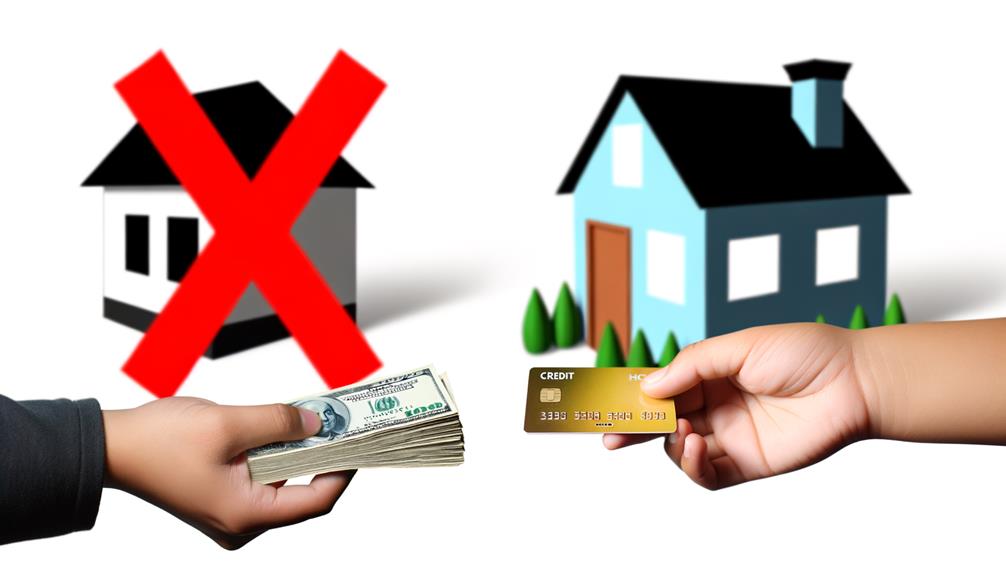In the realm of real estate transactions, the idea of paying cash for a house may seem like a straightforward, even advantageous proposition. After all, it eliminates the need for mortgage repayments and may offer a certain type of financial freedom.
However, when the concept is inspected more closely, it becomes evident that this choice may not only be limiting but also potentially detrimental to one's long-term financial health. Numerous factors such as liquidity, unexpected costs, limited diversification, and missed investment opportunities serve as compelling counterarguments to an all-cash home purchase.
This article aims to unfold and explore these complexities, offering a comprehensive perspective on the potential pitfalls of forgoing financing when purchasing a house.
Key Takeaways
- Liquidity and access to cash reserves are important considerations when purchasing a house, as selling a house can be a lengthy process and delays access to cash reserves.
- High repair and renovation costs can be a burden for cash buyers, as they cannot spread these expenses over time like buyers with a mortgage.
- Maintenance costs can also be a significant burden for cash buyers, as they bear the full brunt of repair costs and may experience rising maintenance costs over time.
- Assessing repair value and consulting with professionals can help determine affordability and potential repairs, with mortgage payments maintaining liquidity and protecting against unforeseen costs.
The Illusion of Liquidity
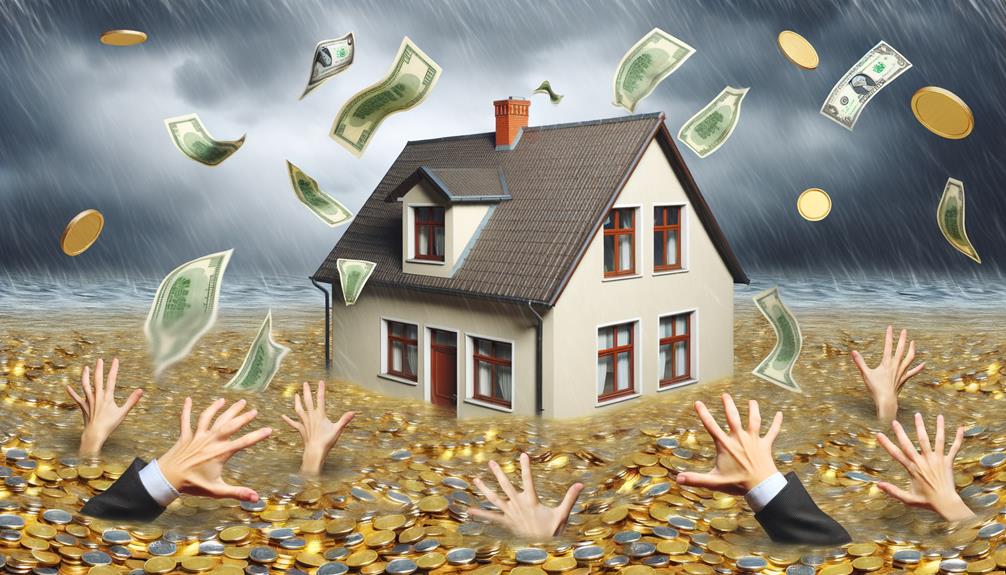
The illusion of liquidity in the context of real estate investment becomes evident when one considers the challenges and time-consuming processes involved in converting a home into immediate cash. A home, contrary to the belief of many, is not an easily liquidated asset like a savings or investment account.
The process of selling a house can be lengthy, often leading to financial constraints during emergencies when immediate cash is needed. This is particularly true when considering the buyer qualification process. To convert your house into cash, you need to find a qualified buyer, a process which can be unpredictable and time-consuming.
Once a buyer is found, if they are using a mortgage to buy the home, the closing process could take anywhere between 30 to 45 days, further delaying access to your cash reserves. This reality challenges the common perception of home equity as an easily accessible amount of money. Thus, to pay all cash for a home or buy a house with cash, might not be the most prudent financial decision.
This highlights the importance of maintaining liquid cash reserves alongside real estate investments. Homes cannot be easily converted into cash, making the notion of paying all cash for a home an illusion of liquidity.
High Repair and Renovation Costs
The purchase of a house invariably comes with the additional burden of high repair and renovation costs.
These unforeseen expenses and surge in maintenance costs can significantly impact your financial stability, making it a less appealing option to pay cash for a house.
It is crucial to assess the potential value of repairs accurately to ensure that your investment is financially sound.
Unforeseen Renovation Expenses
One significant pitfall that cash buyers often encounter is the burden of high repair and renovation costs. These costs can swiftly drain their finances if structural issues or major system failures emerge unexpectedly after purchase. Paying for a house outright leaves little room for unforeseen renovation expenses. Unlike home buyers opting for a home loan, cash buyers can't spread these costs over time.
This financial strain is further compounded by homeowners insurance, property taxes, and possibly higher-than-anticipated home prices. Additionally, a home inspection might not always reveal latent defects, leading to unplanned expenses.
Therefore, while the purchase price might seem attractive initially, the potential for unexpected renovation costs presents a persuasive argument against paying cash for a house.
Maintenance Cost Surge
Unexpectedly high maintenance costs can significantly burden cash buyers, as their financial reserves may be severely impacted by necessary repairs and renovations. This maintenance cost surge often remains unaccounted for during the initial home buying process.
Unlike in a mortgage-backed home purchase, cash buyers in the real estate market bear the full brunt of repair costs.
The absence of mortgage payments doesn't equate to zero expenditure post buying a home.
A house, though bought and paid for, can cause financial stress due to rising maintenance costs.
When you buy a house, one must factor in the potential for a maintenance cost surge, especially when paying cash for a house.
Thus, cash purchases of properties, though seemingly advantageous, carry hidden financial risks associated with high maintenance costs.
Assessing Repair Value
Given the potential for high maintenance costs, it becomes crucial for prospective cash buyers to thoroughly assess the anticipated repair and renovation expenses before committing to a purchase.
Too often, eager buyers use their cash to buy a home without fully assessing repair value, leading to unexpected costs. Consulting with a financial advisor and a trusted real estate agent can provide a more accurate estimate.
This cost assessment is essential in determining the house you can afford. Consider a home equity loan as an alternative, freeing up cash for potential repairs and ensuring your property remains a sound investment. By making mortgage payments, you maintain liquidity and protect yourself from substantial, unforeseen costs.
A well-informed decision now can stave off financial stress down the line.
Settling for Less Than Ideal
How often do we consider that limited cash for renovations and personalization might lead us to settle for a home that's less than ideal? When you're planning to buy a house with an all-cash offer, you are often restricted by the amount of available funds. This constraint may lead to compromising on the quality or location of your new home.
Consider the following:
- Limited funds may restrict your ability to make necessary renovations or personalize the house to your taste. A mortgage loan might allow for these additional expenses.
- An all-cash offer may limit your choice of properties within a specific price range. Taking out a mortgage could expand your options.
- The cash offer places a significant amount of your liquidity into the purchase of a home, potentially leaving you vulnerable in case of emergencies or other financial opportunities.
- Regular mortgage payments may be more manageable and allow for better financial planning compared to a large lump sum payment.
Thus, when considering buying a house, it may be more beneficial to take out a mortgage to purchase your ideal home, rather than settling for less with a limited cash offer.
The Capital Gains Trap
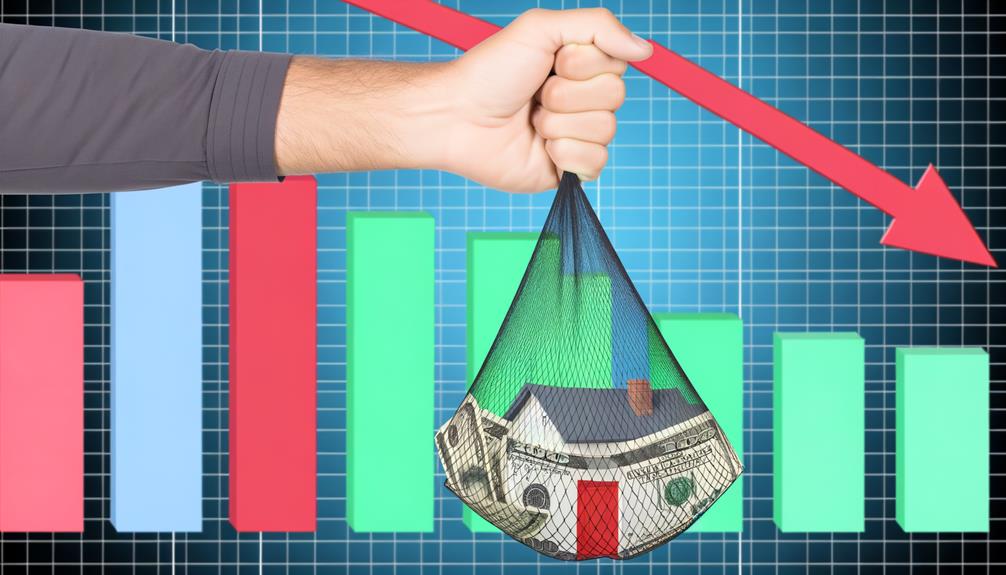
A considerable amount of your uninvested capital could be caught in the 'Capital Gains Trap' when you opt to pay cash for a house, resulting in potential tax liabilities and missed investment opportunities.
Paying Cash can seem appealing, freeing you from monthly mortgage payments and offering a sense of financial security. Yet, it's essential to consider the broader financial landscape.
Those who purchase a home with a mortgage have the opportunity to invest their liquid capital elsewhere, potentially reaping significant returns. Mortgage lenders also offer cash-out refinance options, allowing homeowners to tap into their property's value for other financial endeavors.
When you pay in cash, your money is tied up in your home, an investment property that, according to the National Association of Realtors, doesn't always increase in value and can be impacted by the unpredictable housing market.
In addition, the capital gains trap can result in a hefty tax bill when selling a cash-bought property that has appreciated in value. By opting for a mortgage, you could mitigate these risks, maintain liquidity, and maximize your financial opportunities.
Therefore, it's worth reconsidering the allure of paying cash for a house.
Missing Future Gains
Building on the concept of the Capital Gains Trap, another compelling reason to reconsider paying cash for a house revolves around the risk of missing out on future investment gains.
- Opportunity Cost: When you use cash to buy a house, you miss the opportunity to invest that money elsewhere. For instance, the S&P 500 index has had a compound average annual growth rate of around 7%. Therefore, the opportunity cost of missing future gains can be higher than the interest paid on a mortgage.
- Interest Rates: While buying a house with cash saves you from paying higher interest on a mortgage, the rate of return on investments can often outpace the interest you would avoid.
- Market Volatility: Although there's risk associated with investments due to market volatility, diversification can help manage this risk, offering potentially higher returns.
- Financial Flexibility: A mortgage to buy a house allows you to maintain liquidity for unexpected expenses or investments.
If you're considering buying a house, weigh the potential future gains against the immediate satisfaction of owning your home outright. It's not just about the house; it's about your overall financial health.
Risk of Reduced Returns
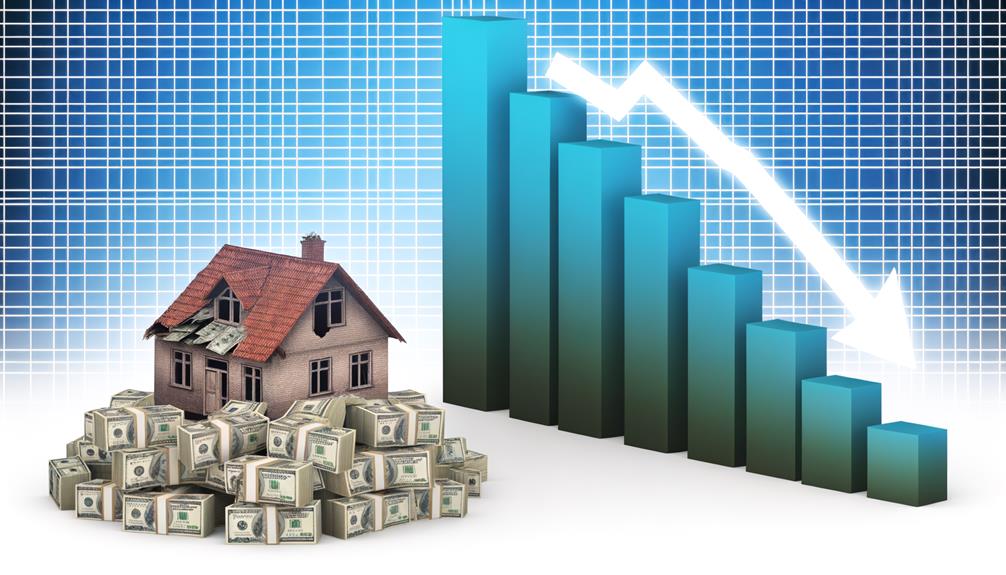
Paying cash for a house can significantly compromise financial liquidity, a critical aspect of personal finance that enables quick response to unexpected expenses or investment opportunities.
Additionally, there's an inherent risk of property depreciation, which could lead to a diminished return on investment.
These factors underscore the potential hazards of paying cash for a house, making it a less appealing option for prospective homeowners.
Financial Liquidity Concerns
Diving headfirst into an all-cash house purchase can significantly impede your financial liquidity, potentially barring you from other lucrative investment opportunities and negatively impacting your overall returns. This cash for your home approach raises several financial liquidity concerns:
- You may not have enough cash left for emergencies, depleting your bank account and leaving you in need of money when unexpected expenses arise.
- You could miss out on the potential growth of your wealth by investing in higher-yield assets.
- Taking out a mortgage and making regular mortgage payments can offer tax benefits through mortgage interest deductions.
- Mortgages often come with lower origination fees compared to other loans, preserving your emergency savings.
Thus, getting a mortgage could be a financially sound decision.
Property Depreciation Potential
While purchasing a house outright may seem like a sound investment, it's critical to consider the potential for property depreciation, which could negatively impact your returns over time. This risk, often overlooked, can reduce the profitability of your purchase. Unforeseen market trends, surrounding infrastructure changes, or physical wear and tear can lead to property devaluation.
| Property Depreciation Potential | Impact on Returns | Mitigation Strategy |
|---|---|---|
| Market trends | Lower resale value | Research and monitor market |
| Location changes | Reduced rental income | Consider second home or diversification |
| Physical wear and tear | Increased maintenance costs | Routine maintenance, lenders title insurance |
Opting for a loan with manageable mortgage payments and competitive mortgage rates, such as a fixed-rate mortgage, can help mitigate this risk. As Maryalene LaPonsie's new PerformanceLogger suggests, a home has good potential, but the risks must be carefully considered.
The Home Insurance Dilemma
In the complex financial landscape of home ownership, one often overlooked yet crucial aspect is the challenge of securing and managing home insurance. This is particularly true when considering the implications of offering to pay for a house in cash.
- Risk of Underinsurance: Paying cash means tying up a significant amount of money in one asset. If the home's value exceeds $141,000, it may be difficult to afford adequate home insurance, leaving the asset unprotected.
- Additional Out-of-Pocket Costs: Home insurance premiums, along with potential application fees, add to the financial burden, potentially straining your financial freedom.
- Mortgage Payments Vs. Insurance Premiums: Mortgage payments often include an element of home insurance, offering peace of mind. Paying cash eliminates this convenience.
- The New Rocket Dilemma: New Rocket, a leading home insurance provider, often provides discounts to homeowners with mortgages, making insurance more affordable.
Dealing With Your Old Home
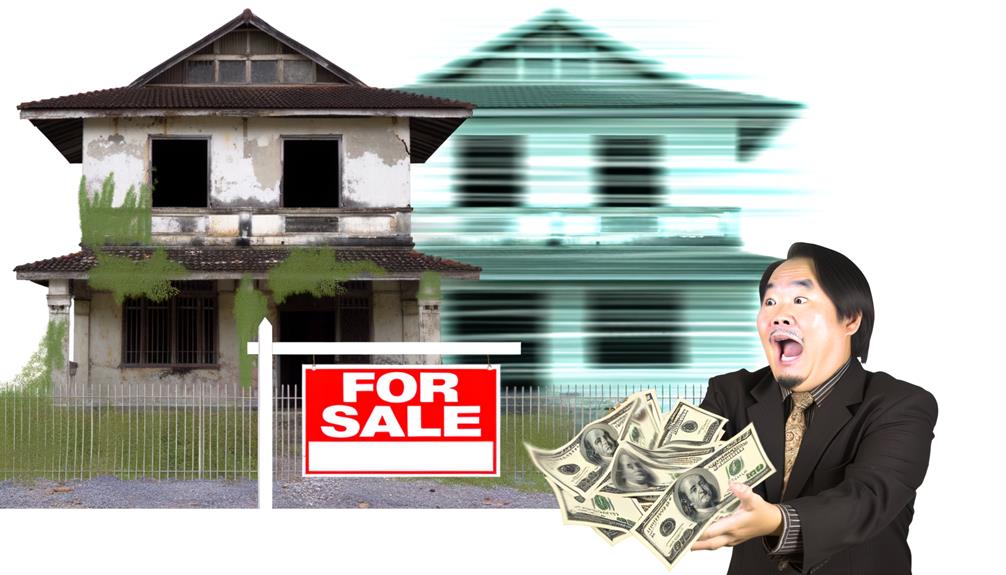
Navigating the transition from one property to another, it is imperative to strategically manage the sale or lease of your old home, an endeavor that demands careful planning and shrewd decision-making. For the vast majority, this involves juggling mortgage payments on two properties. But with careful analysis of the pros and cons, you can take advantage of this situation.
Selling your old home may seem like the right move, as it brings in a lot of money upfront. However, if you paid cash for your new home, you're able to save on mortgage payments, giving you the flexibility to lease your old home. This can provide a steady stream of income, easing the financial burden of your new property.
However, you must make sure that renting out your old home aligns with your long-term financial goals. It may require additional responsibilities and costs, such as property management and maintenance.
Ultimately, whether you decide to sell or lease, ensure you've weighed all options and made a calculated decision. This strategic approach to your old home could significantly benefit your financial future.
Frequently Asked Questions
Does It Ever Make Sense to Buy a House With Cash?
While cash purchases can simplify real estate negotiations, potential drawbacks like reduced future liquidity, lost investment potential, and homeownership risks often outweigh potential benefits. A mortgage may offer more flexibility given stable interest rates and good credit scores.
How Much Less Should You Offer on a House When Paying Cash?
Cash negotiations in real estate market vary, however, cash buyers might offer 5-10% less, considering their financing alternatives. Fair pricing depends on seller's perspective, purchase agreement terms, and investment considerations for the property.
Is It Suspicious to Buy a House With Cash?
While not inherently suspicious, cash purchases can raise legal concerns, such as money laundering risks and potential real estate scams. Financing alternatives can bypass these issues, offering protection against market volatility and addressing insurance considerations.
Why Does the IRS Need to Know When You Buy a House With Cash?
The IRS scrutinizes large cash transactions, including house purchases, to prevent tax evasion and money laundering. Reporting large transactions is required by IRS regulations to ensure tax implications are properly addressed and legalities are observed.
Conclusion
In conclusion, the allure of outright home ownership through cash payment is a deceptive mirage, obscuring the potential pitfalls. These include the illusion of liquidity, high renovation costs, possible compromises on one's dream home, the risk of the capital gains trap and missing out on future investment returns.
Additionally, the home insurance dilemma and challenges in managing old homes further complicate this scenario. Thus, paying cash for a house may be a financially perilous decision.

